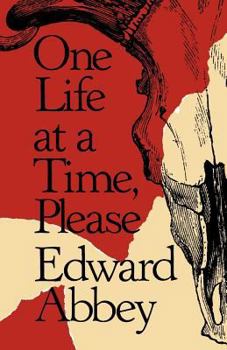One Life at a Time, Please
Select Format
Select Condition 
Book Overview
From stories about cattlemen, fellow critics, his beloved desert, cities, and technocrats to thoughts on sin and redemption, this is one of our most treasured writers at the height of his powers.
Format:Paperback
Language:English
ISBN:0805006036
ISBN13:9780805006032
Release Date:February 1988
Publisher:St. Martins Press-3PL
Length:225 Pages
Weight:0.65 lbs.
Dimensions:0.6" x 5.5" x 8.5"
Customer Reviews
5 ratings
classic abbey
Published by Thriftbooks.com User , 15 years ago
This collection of essays is a wonderful snapshot of Abbey's talent. If you like these, try some of his books.
More insight into Abbey the man, and Abbey the writer...
Published by Thriftbooks.com User , 15 years ago
This book is a collection of shorter pieces published by Edward Abbey in magazines, newspapers, newsletters, and other venues. It is organized (roughly) into the following sections: politics, travel, and literature/art. Some chapters were of greater interest to me than others, but all gave me greater insight into Edward Abbey the man, and Ed Abbey, the writer. Highlights and controversies: Abbey has been called lots of things, but when he was accused of being "...arrogant, incoherent, flippant, nonsensical, nasty, and unconstructive..." after publishing an anti-cattle-on-western-public-lands rant, he commented, "'Nasty and unconstructive' - I love that" (p. 3). "The rancher (with a few honorable exceptions) is a man who strings barbed wire across the range; drills wells and bulldozes stockponds; drives off elk and antelope and bighorn sheep; poisons coyotes and prairie dogs; shoots eagles, bears, and cougars on sight; supplants the native grasses with tumbleweed, snakeweed, povertyweed, cow[manure], anthills, mud, dust, and flies. And then leans back and grins at the TV cameras and talks about how much he loves the American West" (p. 17-18). "And if the wilderness is our true home, and if it is threatened with invasion, pillage, and destruction - as it certainly is - then we have the right to defend that home, as we would our private quarters, by whatever means are necessary" (p. 31). "'Paw,' says my little brother, as the old man loads the shotgun, 'let me shoot the deer this time.' 'You shut up,' I say. Our father smiles. 'Quiet,' he whispers, 'both of you. Maybe next year.' He peers down the dim path in the woods, into the gathering evening. 'Be real still now. They're a-comin'. And Ned -' He squeezes my shoulder. 'You hold that light on 'em good and steady this time.' 'Yes, sire,' I whisper back. 'Sure will, Paw'" (p. 39-40). [This is one of Abbey's most controversial essays, in a life full of controversial essays.] "Poverty, injustice, overbreeding, overpopulation, suffering, oppression, military rule, squalor, torture, terror, massacre: these ancient evils feed and breed one one another in synergistic symbiosis. To break the cycles of pain at least two new forces are required: social equity - and birth control. Population control. Our Hispanic neighbors are groping toward this discovery. If we truly wish to help them we must stop meddling in their domestic troubles and permit them to carry out the social, political, and moral revolution which is both necessary and inevitable. Or if we must meddle, as we have always done, let us meddle for a change in a constructive way. Stop every campesino at our southern border, give him a handgun, a good rifle, and a case of ammunition, and send him home. He will know what to do with our gifts and good wishes. The people know who their enemies are" (p. 44). "Only a fool envies the joy of a child; a grown-up man or woman shares in that joy" (p. 63). "It seldom fails: there'
Good, but not great.
Published by Thriftbooks.com User , 15 years ago
It is a collection of essays across the years. As usual in a book like this, it is uneven. Some essays are funny, inspiring, hard-hitting, others are dull. I found the best essays were when he was describing the desert Southwest. The worst were those where he was talking about the art of writing. All in all, I was glad I bought this book. It has enough good in it to overcome the bad. Thus, it is rated a 4, although some of the essays were 5's, other's were 3's.
Abbey's best non-fiction after Desert Solitaire
Published by Thriftbooks.com User , 26 years ago
Of all Abbey's non-fiction titles, I liked One Life at A Time best after Desert Solitaire. It's vintage Abbey at his best. You may not agree with his political views in this book of essays. But you'll find his arguments compelling and logical. "Immigration And Other Liberal Taboos" is a classic. So is "The Future of Sex" in which he asks the question, "What is femininity?" Gloria Steinham be damned.
An appetizer to the seven course meal that is Edward Abbey!
Published by Thriftbooks.com User , 27 years ago
This book of essays gives the reader new to Abbey a brief but coherent representation of his cannon. Among favorites in the book are "Theory of Anarchy" where he outlines a lifestyle and society where the individual is priority; "Lake Powell Houseboat" where Abbey uses the pastoral wonder of the Colorado River to reflect on personal experience; and finally the flag ship essay of the entire collection: "A Writer's Credo." Here Abbey outlines the true purpose of the freelance writer "to oppose injustice, to defy power, and to speak out for the voiceless." All Abbey followers should own this book and all who are interested should buy one





